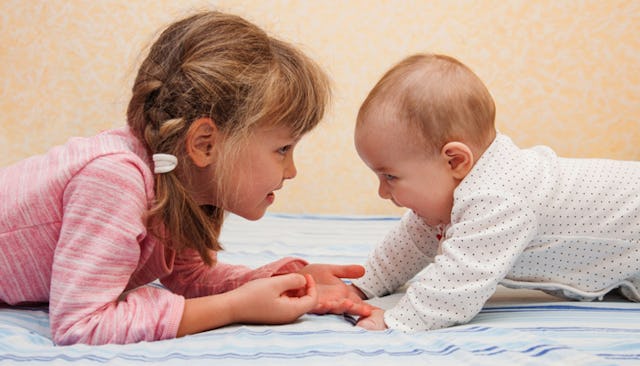The Burden Of Being Firstborn

I think about how you said sorry so quickly when you knocked over the cereal box this morning, and my insides constrict. I told you it was fine—it was an accident. I brushed it away. But that doesn’t change the fact that you rushed to say sorry. Have I made you that way? Have I heaped these expectations on you, as the firstborn child?
I sit here thinking about giving you a big hug tomorrow morning when you wake up. I resolve to be better. To stop expecting so much, to remember that you’re only 7. But I already know that the first time something comes up to distract me, I’ll forget again.
If you’re slow to get ready for school in the morning, I know I’ll rush you.
If the end of your hair trails into your breakfast, I’ll sigh and remind you to tie it up.
If you disappear halfway through breakfast to read your book, I’ll probably snap at you.
If your little brother does the same? There will be no snapping—maybe exasperation, but he’s only 3. And that’s not fair. In the bigger scheme of things, 7 isn’t so different from 3. But you’re the oldest, and more is expected.
It’s not fair. I mean to change, and I’ll try to change. But I already know this is a lifelong (or childhood-long) road.
When you were 3, as your brother is now, I expected too much. You were the big sister, no longer a baby. In hindsight, it was ridiculous, but I expected so much. He wanders off during mealtimes, helps himself to bread from the press, insists on putting on his own clothes no matter how long it takes, and always gets the toy. Ah girls, he’s only small. Let him have it.” You had no such allowances at 3. I expected you to be grown-up, to do as you were told, to follow the rules. I expected too much.
When you were 6, as your sister is now, you were the big girl—in school, articulate, capable of understanding every instruction. When you didn’t, I grew frustrated. When you were cross, when you found it hard to adapt to change, I didn’t understand. With your sister, I tiptoe. I anticipate change, I prepare her, and I praise her when she has a smooth transition. Why didn’t I know to do that with you? I expected far too much.
And I already know, when your sister is 7, when your brother is 7, I’ll have lowered my expectations. I won’t see them as grown-up. I’ll see them as they are now—children, still learning, little people for whom I need to make allowances. And I need to realize that now, not in two or five years.
You’re only 7, and being the oldest doesn’t make you older than your years. You can be grown-up: looking after your siblings, helping me with dishes, choosing your own clothes. And you can be little: chasing your brother around the table at breakfast time, not having a sense of urgency about the morning rush, letting your hair trail in your food. Of course, you can. You’re a little girl, and I need to remember that. I don’t need to lower my expectations. You’re perfect, just perfect as you are. I need to raise my expectations of myself, and remember in the morning to hug you twice and tie your hair back for you.
This article was originally published on